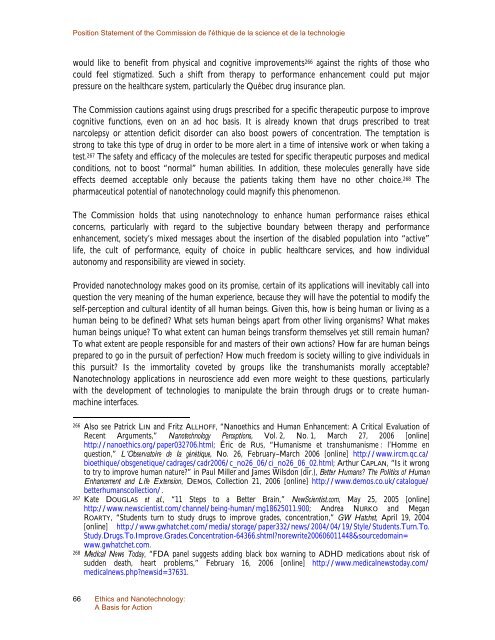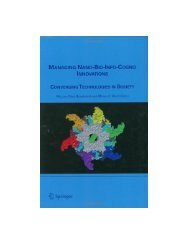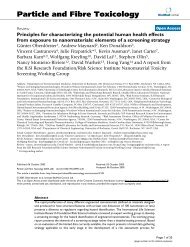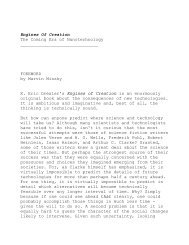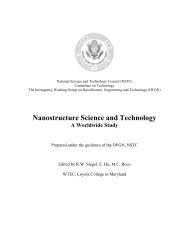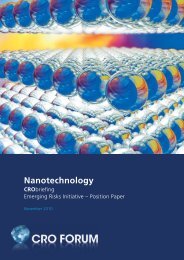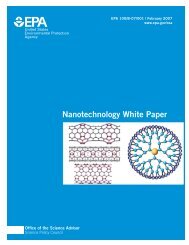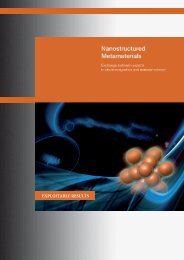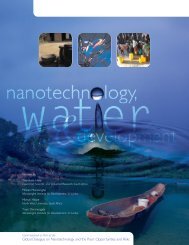A Basis for Action - Commission de l'éthique de la science et de la ...
A Basis for Action - Commission de l'éthique de la science et de la ...
A Basis for Action - Commission de l'éthique de la science et de la ...
Create successful ePaper yourself
Turn your PDF publications into a flip-book with our unique Google optimized e-Paper software.
Position Statement of the <strong>Commission</strong> <strong>de</strong> l'éthique <strong>de</strong> <strong>la</strong> <strong>science</strong> <strong>et</strong> <strong>de</strong> <strong>la</strong> technologie<br />
would like to benefit from physical and cognitive improvements 266 against the rights of those who<br />
could feel stigmatized. Such a shift from therapy to per<strong>for</strong>mance enhancement could put major<br />
pressure on the healthcare system, particu<strong>la</strong>rly the Québec drug insurance p<strong>la</strong>n.<br />
The <strong>Commission</strong> cautions against using drugs prescribed <strong>for</strong> a specific therapeutic purpose to improve<br />
cognitive functions, even on an ad hoc basis. It is already known that drugs prescribed to treat<br />
narcolepsy or attention <strong>de</strong>ficit disor<strong>de</strong>r can also boost powers of concentration. The temptation is<br />
strong to take this type of drug in or<strong>de</strong>r to be more alert in a time of intensive work or when taking a<br />
test. 267 The saf<strong>et</strong>y and efficacy of the molecules are tested <strong>for</strong> specific therapeutic purposes and medical<br />
conditions, not to boost “normal” human abilities. In addition, these molecules generally have si<strong>de</strong><br />
effects <strong>de</strong>emed acceptable only because the patients taking them have no other choice. 268 The<br />
pharmaceutical potential of nanotechnology could magnify this phenomenon.<br />
The <strong>Commission</strong> holds that using nanotechnology to enhance human per<strong>for</strong>mance raises <strong>et</strong>hical<br />
concerns, particu<strong>la</strong>rly with regard to the subjective boundary b<strong>et</strong>ween therapy and per<strong>for</strong>mance<br />
enhancement, soci<strong>et</strong>y’s mixed messages about the insertion of the disabled popu<strong>la</strong>tion into “active”<br />
life, the cult of per<strong>for</strong>mance, equity of choice in public healthcare services, and how individual<br />
autonomy and responsibility are viewed in soci<strong>et</strong>y.<br />
Provi<strong>de</strong>d nanotechnology makes good on its promise, certain of its applications will inevitably call into<br />
question the very meaning of the human experience, because they will have the potential to modify the<br />
self-perception and cultural i<strong>de</strong>ntity of all human beings. Given this, how is being human or living as a<br />
human being to be <strong>de</strong>fined? What s<strong>et</strong>s human beings apart from other living organisms? What makes<br />
human beings unique? To what extent can human beings trans<strong>for</strong>m themselves y<strong>et</strong> still remain human?<br />
To what extent are people responsible <strong>for</strong> and masters of their own actions? How far are human beings<br />
prepared to go in the pursuit of perfection? How much freedom is soci<strong>et</strong>y willing to give individuals in<br />
this pursuit? Is the immortality cov<strong>et</strong>ed by groups like the transhumanists morally acceptable?<br />
Nanotechnology applications in neuro<strong>science</strong> add even more weight to these questions, particu<strong>la</strong>rly<br />
with the <strong>de</strong>velopment of technologies to manipu<strong>la</strong>te the brain through drugs or to create humanmachine<br />
interfaces.<br />
266 Also see Patrick LIN and Fritz ALLHOFF, “Nano<strong>et</strong>hics and Human Enhancement: A Critical Evaluation of<br />
Recent Arguments,” Nanotechnology Perceptions, Vol. 2, No. 1, March 27, 2006 [online]<br />
http://nano<strong>et</strong>hics.org/paper032706.html; Éric <strong>de</strong> RUS, “Humanisme <strong>et</strong> transhumanisme : l’Homme en<br />
question,” L’Observatoire <strong>de</strong> <strong>la</strong> génétique, No. 26, February–March 2006 [online] http://www.ircm.qc.ca/<br />
bio<strong>et</strong>hique/obsgen<strong>et</strong>ique/cadrages/cadr2006/c_no26_06/ci_no26_06_02.html; Arthur CAPLAN, “Is it wrong<br />
to try to improve human nature?” in Paul Miller and James Wilsdon (dir.), B<strong>et</strong>ter Humans? The Politics of Human<br />
Enhancement and Life Extension, DEMOS, Collection 21, 2006 [online] http://www.<strong>de</strong>mos.co.uk/catalogue/<br />
b<strong>et</strong>terhumanscollection/.<br />
267 Kate DOUGLAS <strong>et</strong> al., “11 Steps to a B<strong>et</strong>ter Brain,” NewScientist.com, May 25, 2005 [online]<br />
http://www.newscientist.com/channel/being-human/mg18625011.900; Andrea NURKO and Megan<br />
ROARTY, “Stu<strong>de</strong>nts turn to study drugs to improve gra<strong>de</strong>s, concentration,” GW Hatch<strong>et</strong>, April 19, 2004<br />
[online] http://www.gwhatch<strong>et</strong>.com/media/storage/paper332/news/2004/04/19/Style/Stu<strong>de</strong>nts.Turn.To.<br />
Study.Drugs.To.Improve.Gra<strong>de</strong>s.Concentration-64366.shtml?norewrite200606011448&sourcedomain=<br />
www.gwhatch<strong>et</strong>.com.<br />
268 Medical News Today, “FDA panel suggests adding b<strong>la</strong>ck box warning to ADHD medications about risk of<br />
sud<strong>de</strong>n <strong>de</strong>ath, heart problems,” February 16, 2006 [online] http://www.medicalnewstoday.com/<br />
medicalnews.php?newsid=37631.<br />
66 Ethics and Nanotechnology:<br />
A <strong>Basis</strong> <strong>for</strong> <strong>Action</strong>


